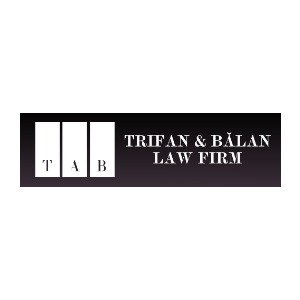Best Conveyancing Lawyers in Romania
Share your needs with us, get contacted by law firms.
Free. Takes 2 min.
Free Guide to Hiring a Real Estate Lawyer
Or refine your search by selecting a city:
List of the best lawyers in Romania
About Conveyancing Law in Romania
Conveyancing in Romania refers to the legal process of transferring ownership of real estate property from one person or entity to another. Whether you are buying, selling, inheriting, or gifting property, certain legal procedures must be followed to ensure the transaction is valid and your rights are protected. Conveyancing in Romania is governed by a mix of civil, property, and notarial laws, making it a specialized area where legal support is important. The process typically involves due diligence on the property, drafting and signing contracts, registering ownership changes with the Land Book, and paying relevant fees and taxes.
Why You May Need a Lawyer
Engaging a lawyer for conveyancing in Romania is highly recommended due to the complexity and high stakes of property transactions. Situations where legal help is essential include the following:
- Buying or selling a residential or commercial property
- Transferring property due to inheritance or divorce
- Dealing with disputes about property boundaries or ownership rights
- Purchasing property as a foreign citizen or business
- Drafting or reviewing preliminary sale agreements and contracts
- Ensuring that the property is free of debts, liens, or other legal issues
- Compliance with zoning, planning, or construction regulations
- Registering property with the National Land Book
A lawyer ensures your transaction is legally sound, protects you from fraud, and helps you avoid costly mistakes during the conveyancing process.
Local Laws Overview
Conveyancing in Romania is primarily regulated by the Romanian Civil Code, the Land Registry Law (Law 7/1996, updated), and various notarial laws. Key aspects include:
- Property transfers must be made in writing and authenticated by a notary public
- The National Land Book (Cadastru si Carte Funciara) is the official register of real estate and is managed by the National Agency for Cadastre and Land Registration (ANCPI)
- Due diligence is required to check for mortgages, encumbrances, or legal claims against the property
- Both parties must provide identification and full documentation proving ownership and property history
- Notary fees and taxes, including property transfer tax, must be paid during the process
- Foreign nationals may purchase land in limited circumstances and must meet additional requirements
- After signing, the transaction is registered with the Land Book, which is necessary for ownership to be recognized
Frequently Asked Questions
What is the role of a notary in Romanian property transactions?
A notary public must authenticate all real estate contracts in Romania. The notary checks the legality of the transaction, verifies ownership documents, drafts or reviews the contract, and registers the transfer with the Land Book.
Can foreigners buy property in Romania?
Yes, foreigners can buy apartments and buildings without restriction. Acquiring land is subject to certain conditions, especially for non-EU citizens, and may require proof of residency or that reciprocal agreements exist with the buyer's country.
What documents are required for a property sale?
Sellers must provide the property's Land Book excerpt, cadastral documentation, energy performance certificate, proof of tax payments, identity documents, and any building permits or titles. Buyers need identification and, in some cases, proof of funds or financing.
How long does the conveyancing process take?
The timeline depends on the complexity of the transaction and the availability of documentation. Typically, the process can take from a few days to several weeks, with most of the time spent gathering paperwork and performing legal checks.
What taxes and fees apply to property transfers?
Buyers and sellers pay notary fees, registration fees, and the property transfer tax. The transfer tax rate varies based on the value of the property and the duration of ownership. Additional local taxes or VAT may apply in some cases.
Is a preliminary agreement necessary?
It is common to sign a preliminary sale-purchase agreement that outlines the terms before the final contract. While not mandatory, it provides security for both parties and can include penalties for non-compliance.
How can I check if a property is free from legal issues?
You can request a Land Book excerpt from the National Agency for Cadastre and Land Registration or through your notary or lawyer. This excerpt shows the ownership status, any debts, mortgages, or legal claims affecting the property.
Do both parties need to be present for signing at the notary?
Both the buyer and the seller usually attend the notarization. In special circumstances, a party may be represented by a legal proxy with a power of attorney.
What happens if there is a dispute after signing?
Disputes are typically settled through negotiation, mediation, or, if necessary, by taking the case to court. Having a lawyer involved from the beginning helps prevent disputes and provides support if issues arise.
Can I buy property remotely or from abroad?
Yes, you can authorize a Romanian lawyer or another trusted party to act on your behalf through a notarized power of attorney. Many steps can be handled remotely, but legal requirements must still be met.
Additional Resources
If you need guidance or assistance with conveyancing in Romania, the following organizations and resources can be helpful:
- National Agency for Cadastre and Land Registration (ANCPI)
- National Union of Notaries Public in Romania
- Romanian Bar Association
- Local city halls or town halls for zoning and tax information
- Independent lawyers specialized in property law and conveyancing
Next Steps
If you are considering a property transaction in Romania, here are the recommended steps:
- Consult with a qualified Romanian lawyer who specializes in real estate and conveyancing
- Gather all necessary property documentation from the current owner or relevant authorities
- Ensure due diligence is performed on the property, including Land Book checks
- Discuss the transaction terms and draft a preliminary agreement if needed
- Have the final contract drafted, reviewed, and notarized by a public notary
- Complete payment of taxes and fees as required by law
- Register the completed transaction with the Land Book for legal ownership
Taking these steps with the help of a legal professional will protect your interests and streamline the often complex process of property conveyancing in Romania.
Lawzana helps you find the best lawyers and law firms in Romania through a curated and pre-screened list of qualified legal professionals. Our platform offers rankings and detailed profiles of attorneys and law firms, allowing you to compare based on practice areas, including Conveyancing, experience, and client feedback.
Each profile includes a description of the firm's areas of practice, client reviews, team members and partners, year of establishment, spoken languages, office locations, contact information, social media presence, and any published articles or resources. Most firms on our platform speak English and are experienced in both local and international legal matters.
Get a quote from top-rated law firms in Romania — quickly, securely, and without unnecessary hassle.
Disclaimer:
The information provided on this page is for general informational purposes only and does not constitute legal advice. While we strive to ensure the accuracy and relevance of the content, legal information may change over time, and interpretations of the law can vary. You should always consult with a qualified legal professional for advice specific to your situation.
We disclaim all liability for actions taken or not taken based on the content of this page. If you believe any information is incorrect or outdated, please contact us, and we will review and update it where appropriate.
Browse conveyancing law firms by city in Romania
Refine your search by selecting a city.

















